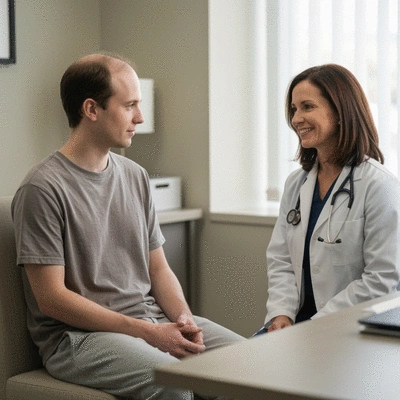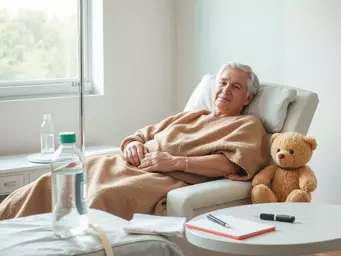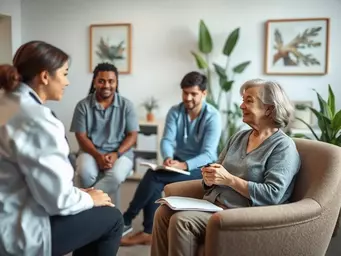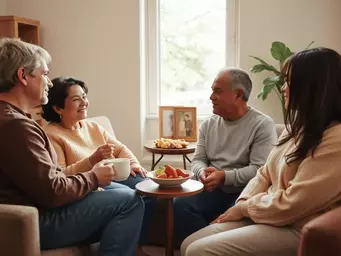Support Resources During Chemotherapy
By Dr. Elise Carter / Jan 28
When navigating chemotherapy, understanding the profound fatigue many patients experience is vital. Did you know that this fatigue isn't just a feeling of tiredness, but a significant challenge that can impact daily life? Exploring its roots and strategies for management can empower you on your cancer journey.
This visual highlights the primary factors contributing to chemotherapy-related fatigue and categorizes effective management strategies into pharmacological and comprehensive coping approaches.
Consult your healthcare provider for personalized options.
When navigating the world of chemotherapy, one common challenge many patients face is fatigue. This isn’t just ordinary tiredness; it’s a profound exhaustion that can sometimes feel overwhelming. Have you experienced a wave of fatigue that made even simple tasks feel monumental? Understanding this symptom is crucial in managing your cancer journey.
Chemotherapy-related fatigue can manifest in various ways, including persistent tiredness, a lack of energy, and difficulty concentrating. It can affect your daily activities, emotional well-being, and overall quality of life. Recognizing these symptoms is the first step toward addressing them effectively.
Chemotherapy-related fatigue is a multifaceted condition that affects many cancer patients. It can occur unexpectedly and often doesn’t improve with rest. Some of the most common symptoms include:
As someone who has worked extensively in oncology, I've seen firsthand how this fatigue can impact patients. It's important to talk to your healthcare team about what you’re experiencing so they can help tailor a plan for support. For further understanding of cancer-related fatigue, the National Cancer Institute provides comprehensive information.
The reasons behind chemotherapy-related fatigue are complex and multifactorial. One significant factor is inflammation. Research shows that chemotherapy can trigger an inflammatory response in the body, which, in turn, leads to fatigue. Understanding this connection can offer insights into how to manage your energy levels during treatment.
Cytokines, which are small proteins released by cells, play a crucial role in the body’s inflammatory response. They can impact how we feel, contributing to feelings of fatigue. Have you noticed fluctuations in your energy levels that coincide with your treatment schedule? This may be linked to the body’s inflammatory response.
Another important aspect to consider is the relationship between depression and fatigue. Many cancer patients experience depression due to their diagnosis and treatment side effects. This emotional strain can exacerbate feelings of fatigue, creating a cycle that can be tough to break. Addressing both emotional and physical aspects is vital for improving quality of life.
Beyond emotional strain, there are several common side effects of chemotherapy that contribute to fatigue. They include:
Being aware of these side effects allows you to engage with your healthcare team proactively. Together, you can identify strategies to combat fatigue and improve your overall well-being during treatment. For additional resources and detailed information, the American Cancer Society offers valuable insights on managing cancer-related fatigue.
To effectively address chemotherapy-related fatigue, various pharmacological treatments can be explored. It’s essential to work closely with your healthcare provider to find the best options for you. Here are some common medications that may be considered:
Each treatment option carries its own benefits and risks, so understanding them is key to making informed decisions in your fatigue management plan. Additionally, updated ASCO guidance expands patient options for interventions, highlighting the evolving approaches to managing cancer-related fatigue.
Have you experienced chemotherapy-related fatigue? We want to hear from you! Share your experience below:
Coping with chemotherapy-related fatigue can feel like an uphill battle, but developing a well-rounded strategy can make a significant difference. As someone who has seen many patients navigate this journey, I often emphasize the importance of a structured approach. A comprehensive coping strategy not only addresses the fatigue itself but also empowers patients to regain some control over their lives during treatment.
One effective method is to create a practical daily routine tailored to individual needs. This routine can act as a roadmap, guiding patients through their day while ensuring they prioritize rest and activity in a balanced way. Have you considered how a simple schedule could help you manage your energy levels?
A well-planned daily routine can ease the overwhelming feelings that accompany chemotherapy. Here are some essential components to consider when creating yours:
By implementing these strategies, you can create a foundation that supports your daily activities while recognizing the importance of rest. Remember, flexibility is key; listen to your body and adjust your routine when necessary.
Integrating various therapies into your daily routine can also enhance your ability to cope with fatigue. This might include both traditional and complementary therapies that fit your lifestyle. Here are some ways to include them:
Incorporating these therapies into your daily life can offer a holistic approach to managing chemotherapy-related fatigue. Have you thought about which therapies resonate with you? Finding the right balance is crucial for maximizing their benefits.
Maintaining motivation during treatment can be challenging, especially when fatigue sets in. Here are some techniques that can help:
Additionally, pacing yourself is essential for conserving energy throughout the day. This might mean alternating between periods of activity and rest. How do you currently pace yourself during daily tasks? Implementing these techniques can lead to more sustainable energy levels and an improved quality of life.
At Types of Chemotherapy, we believe that sharing experiences can empower patients facing chemotherapy-related fatigue. Learning from others who have walked a similar path can provide valuable insights and inspire hope.
Many patients have successfully navigated their fatigue challenges by adopting personalized coping strategies. For instance, one patient shared how incorporating gentle yoga into her routine not only alleviated her fatigue but also enhanced her overall sense of well-being. These stories remind us that we are not alone in this journey.
Have you considered reaching out to fellow patients? Connecting with others can foster a sense of community and provide additional support as you navigate your treatment.
Building a network of support is crucial in managing chemotherapy fatigue. Engaging with community resources can provide you with additional tools and strategies. Consider the following:
By tapping into community support and sharing resources, you can create a stronger foundation to face the challenges of chemotherapy-related fatigue. Have you found a group or resource that resonates with you? Engaging with others can be a powerful tool in your coping strategy.
As we wrap up our discussion on coping with chemotherapy-related fatigue, it's important to remember that there are many avenues available to manage and alleviate this condition. Your health journey is unique, and taking proactive steps can lead to improved energy levels and overall well-being.
Key strategies for managing fatigue include creating a practical daily routine, incorporating therapies, and building a supportive network. Each person's journey with chemotherapy is different, and identifying what works best for you will empower your ability to cope with fatigue effectively.
Never hesitate to reach out for professional guidance as you navigate your treatment. Whether it's discussing medications, therapies, or lifestyle changes, your healthcare team is there to support you. Remember, you are not alone in this journey. How can you take the next step today to enhance your coping strategy?
Here is a quick recap of the important points discussed in the article:



 Support Resources During Chemotherapy
Did you know that support resources can significantly ease the journey through chemotherapy? Underst
Support Resources During Chemotherapy
Did you know that support resources can significantly ease the journey through chemotherapy? Underst
 Supporting Mental Health in Chemotherapy
When you think about cancer treatment, how often do you consider the emotional toll it takes on pati
Supporting Mental Health in Chemotherapy
When you think about cancer treatment, how often do you consider the emotional toll it takes on pati
 Chemotherapy's Impact on Relationships
Have you ever considered how a cancer diagnosis can reshape the relationships around you? The emotio
Chemotherapy's Impact on Relationships
Have you ever considered how a cancer diagnosis can reshape the relationships around you? The emotio